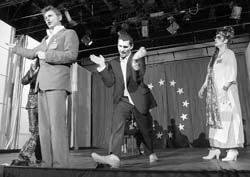<I>Orpheus, the Illegal Alien</I> visits Kyiv
Young Theater stages a “dramatized film with a prologue and epilogue”
Yuri Andrukhovych’s Orpheus, the Illegal Alien, is a joint project by the Kyiv Young Theater, Politeama Garibaldi Theatre (Palermo), and the Dusseldorfer Schauspielhaus. The stage director is Anna Badora, the director of the Dusseldorfer Schauspielhaus, who launched the international theater project “New Europe - Waiting for the Barbarians.” This project is a response to the events of 2004, when the European Union again refused to admit Ukraine and several Eastern European countries. Leading writers from Lithuania, Poland, the Czech Republic, and Ukraine created exclusive dramatic texts for the stage production, which reflect their attitude to these events.
The hero Stanislav Perfetsky, i.e., Orpheus, the Illegal Alien (40 aliases in all), is split in two in the play and is played by two actors, Stanislav Boklan (Ukraine) and Michael Fuchs (Germany). Interestingly, despite the totally different acting styles and psychophysics, the image of the hero becomes a whole. Perfetsky is an ironic intellectual who “writes poems and is always in a state of affect, that is, extreme infatuation.” Sometimes conflicting traits are combined in each of us. Perfetsky’s other “half,” portrayed by Fuchs, is the hero’s brain, whereas the half played by Boklan is his heart, which loves and sings Ukrainian songs. However, not everything is that clear-cut. Fuchs is quite capable of launching wholeheartedly into “Oh, the reapers on the hill” almost without the trace of an accent.
Perfetsky finds himself in Venice, the heart of Europe, where he delivers a speech for a sophisticated audience and tries to explain that “Subeurope is not just us without you. Without us you are also Subeurope, an incomplete and unrealized Europe.” In one scene agents tail Perfetsky, wearing masks and black veils that cover their heads and shoulders. They ceremoniously carry a huge fish, caught and deprived of its freedom, in other words — doomed. This is Aesopian language of contemporary theater, in which mythological symbols are used instead of words — a kind of magical ceremony, ritual, a theater within a theater. But they cannot catch the fish in their net because Perfetsky always slips through at the very last moment, even by jumping out of a window and into the deep waters of a Venetian canal.
This show is marked by the magical and lucky number three:
1. The cast uses three languages - Ukrainian, German, and Italian.
2. Three styles of performance: presentation, habitation, and dell’arte.
3. Perfetsky’s three underlying realities. Toward the finale the author, Yuri Andrukhovych, comes out on stage to help his hero deliver his speech, thereby becoming another integral component of Stanislav, perhaps the most important one: his soul. Every author, whether he likes it or not, portrays himself and his feelings, thoughts, and secret desires. “Frankly speaking, there is no such person. But he is everything I would want to be,” says Yuri Andrukhovych.
A number of scenes are realized through the aesthetics of political theater. Quite a few characters are utterly grotesque yet recognizable, created using hyperbolized traits inherent in modern Western society.
Perversion, the Andrukhovych novel on which this play is based, has more layers and aspects. Despite this and the fact that the play is acted in the Western theatrical style, which is unusual for us, it touched the Kyiv public’s heart.






